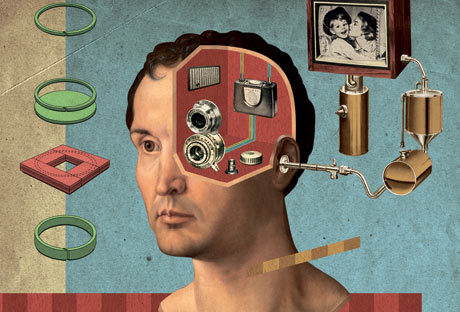Memory mythsby Christian Jarrett
Many of us subscribe to false beliefs about how our memories work, sometimes with serious consequences. We debunk some common myths

As a lifelong user of human memory, you probably feel you've got a good idea of how it works, right? To test your understanding of memory, we compare several commonplace conceptions with insights from psychology ...
Memory acts like a video recorderIn a US survey published in 2011, 63% of 1,838 respondents said they believed "strongly" or "mostly" that memory works like a video camera, "accurately recording events we see and hear so that we can review and inspect them later". Memory is, in fact, a creative, fallible process, highly prone to suggestion and other distorting influences.
Some people have photographic memoriesAn extension to the memory as video recorder myth is the idea that some people have a "photographic memory"; that they can take a snap shot of a scene or a page in a book, and then bring it to mind whenever they want to.
It's tempting to invoke such an ability to explain the achievements of celebrated memory champions such as Lu Chao. In 2005, he set a new world record (as recognised by the Guinness World Records) by reciting the first 67,890 digits of pi entirely from memory. However, studies of memory champions reveal that they depend on mnemonic devices and thousands of hours of practice.
A related concept is eidetic imagery, in which a person claims to "see" a detailed visual scene that is no longer visible. However, tests of "eidetikers" find their memory of images to be no more accurate than control participants. It seems they just feel as though the image is vivid and still "out there" rather than in their heads.
Forgetting occurs graduallySome memory misconceptions have serious consequences for the way eye- (and ear-) witness testimony is treated in court. For example, many people, including psychologists (according to a recent Norwegian survey), believe that forgetting occurs gradually, as if memories decay like an ageing reel of film. In fact, most forgetting occurs immediately after an event.
Confidence is a reliable indicator of memory accuracyWhile it's true that accuracy and confidence can correlate within a single person's repertoire of recollections, confidence is a poor marker of accuracy when judging a single act of recollection or when comparing across witnesses. One reason is that some factors, such as repeated questioning, can boost confidence without increasing accuracy. Also, we all vary in our baseline levels of memory confidence. So when judging a single witness, we don't know if their confidence is high by their standards. In the legal system, when convicted people are exonerated by DNA evidence, confident testimony from an eye witness is the most common reason they were originally found guilty.
A related myth is that emotional events lead to more ingrained, accurate memories. Memories for dramatic events often feel more vivid and people feel more confident in these memories, but, in fact, they are just as prone to being forgotten as ordinary memories. Furthermore, if an event is stressful, this is likely to interfere with remembering details of that event.
Traumatic memories can be repressed and "recovered" years after they occurredWhile subscribing to the erroneous idea that memories of emotive events are highly accurate, many people also often hold the somewhat paradoxical belief that traumatic memories, such as of abuse in childhood, are prone to repression. A related belief is that such memories can be "recovered" later in life, dug out with the help of a skilled therapist, or perhaps a hypnotist.
In fact, studies of child abuse victims suggest strongly that they usually do not forget their experiences. Moreover, research has shown that memories of abuse "recovered" in therapy are far less likely to be corroborated by third parties, or other evidence, than abuse memories recalled later in life outside of therapy, or never-forgotten abuse memories.
The consensus of the American Psychological Association on child abuse memories says that "most people who were sexually abused as children remember all or part of what happened to them, although they may not fully understand or disclose it".
Hypnosis can be used to retrieve forgotten memoriesMany people believe that hypnosis can be used to unearth not only past traumas but all manner of long-forgotten memories, including recollections way back to the womb or even to past lives.
In a way, it is a belief that is consistent with the "memory as a video recorder" myth; the mistaken rationale being that because everything we experience is stored, we just need to find a way to reach it. In fact, nearly all the evidence suggests that hypnosis fails to aid recall, but instead has the potentially harmful effect of increasing people's faith in their memories, whether or not they are accurate recollections of events.
Amnesiacs forget who they areA persistent myth is the idea that people suffering from amnesia have lost their long-term memory, including any recollection of their identity. In fact, amnesia caused by illness or brain damage typically manifests as an inability to lay down new memories. Specifically what is broken is the ability to convert short-term memories into long-term memories. An amnesiac will usually be able to tell you who they are and share stories about their earlier lives, but they won't be able to tell you what they had for breakfast.
• Dr Christian Jarrett is author of The Rough Guide to Psychology. He blogs for the British Psychological Society at bps-research-digest.blogspot.com and is currently writing Great Myths of the Brain (Wiley-Blackwell). Follow him on Twitter at @Psych_Writer
• This article was corrected on 16 January 2012 because it said Hideaki Tomoyori set a new world record for reciting the first 67,890 digits of pi entirely from memory. Lu Chao set this record.
http://www.guardian.co.uk/lifeandstyle/2012/jan/14/truth-about-memories-jarrett?CMP=twt_gu